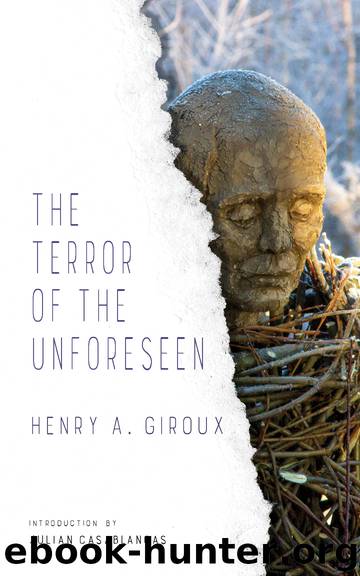The Terror of the Unforeseen by Giroux Henry; Casablancas Julian;

Author:Giroux, Henry; Casablancas, Julian;
Language: eng
Format: epub
Publisher: Los Angeles Review of Books
Published: 2019-09-05T16:00:00+00:00
III
I want to go back to a central concern of this chapter by raising the question of how as educators we begin a meaningful conversation about how to redefine and reclaim the mission of colleges and universities as democratic public spheres? In doing so, I want to address in general terms the importance of what I have called the need for a new language of governance accompanied by a reclaiming of the discourse of civic courage and the ethical imagination, all of which I believe are central to any viable notion of change that I am suggesting. This is especially crucial at a time when higher education in the United States is under attack by a savage form of casino capitalism. Regarding the politics of governance, I have argued both explicitly and implicitly that educators, students, and others concerned about the fate of higher education need to mount a spirited attack against the managerial takeover of the university that began in the late 1970s with the emergence of a market fundamentalism called neoliberalism, which is an economic system that argues that market principles should govern not just the economy but all of social life, including politics and education. Neoliberalism thins out politics, reducing it to the language, power, and values of the market while turning it over to the rule of the ultra-rich, big corporations, and Wall Street billionaires. In doing so, it hollows out both the social state and public life through policies that massively increase inequalities of wealth and power, which further destroy the institutions, including public and higher education, which provide the foundations for informed, critical, and engaged forms of citizenship.
As an ideology and policy, neoliberalism has produced cruel austerity measures, defunded public institutions, pushed through skyrocketing tuition hikes, and created what amounts to a culture dominated by metrics and increasingly devoid of humanistic values.316 Central to such a recognition is the need to struggle against a university system developed around the reduction in faculty power, the replacement of a culture of cooperation and collegiality with a shark-like culture of competition, the rise of an audit culture that has produced a very limited notion of accountability and evaluation, and the narrow and harmful view that colleges “should operate more like private firms than public institutions, with an onus on income generation.”317 In addition, any movement for reforming colleges and universities must both speak out against modes of governance that have reduced faculty to the status of part-time employees and join the fight to take back the governing of the university from the new class of managers and bureaucrats that now outnumber faculty in the United States.
Regarding the discourse of civic courage and the ethical imagination, I have argued that informed citizens are crucial to a democracy and that the university must play a vital role in creating the formative cultures that make such citizens possible. In part, this would mean creating intellectual spaces free of coercion and censorship and open to multiple sources of knowledge in the
Download
This site does not store any files on its server. We only index and link to content provided by other sites. Please contact the content providers to delete copyright contents if any and email us, we'll remove relevant links or contents immediately.
| Anarchism | Communism & Socialism |
| Conservatism & Liberalism | Democracy |
| Fascism | Libertarianism |
| Nationalism | Radicalism |
| Utopian |
The Secret History by Donna Tartt(18159)
The Social Justice Warrior Handbook by Lisa De Pasquale(11951)
Thirteen Reasons Why by Jay Asher(8451)
This Is How You Lose Her by Junot Diaz(6435)
Weapons of Math Destruction by Cathy O'Neil(5829)
Zero to One by Peter Thiel(5488)
Beartown by Fredrik Backman(5356)
The Myth of the Strong Leader by Archie Brown(5237)
The Fire Next Time by James Baldwin(5016)
How Democracies Die by Steven Levitsky & Daniel Ziblatt(4954)
Promise Me, Dad by Joe Biden(4908)
Stone's Rules by Roger Stone(4857)
100 Deadly Skills by Clint Emerson(4690)
A Higher Loyalty: Truth, Lies, and Leadership by James Comey(4550)
Rise and Kill First by Ronen Bergman(4545)
Secrecy World by Jake Bernstein(4388)
The David Icke Guide to the Global Conspiracy (and how to end it) by David Icke(4380)
The Farm by Tom Rob Smith(4323)
The Doomsday Machine by Daniel Ellsberg(4245)
